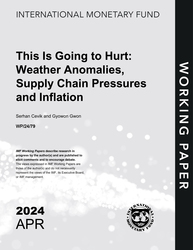
This Is Going to Hurt: Weather Anomalies, Supply Chain Pressures and Inflation
This Is Going to Hurt: Weather Anomalies, Supply Chain Pressures and Inflation
READ MORE...
Volume/Issue:
Volume 2024
Issue 079
Publication date: April 2024
ISBN: 9798400269523
$20.00
Add to Cart by clicking price of the language and format you'd like to purchase
Available Languages and Formats
| English |
Prices in red indicate formats that are not yet available but are forthcoming.
Topics covered in this book
This title contains information about the following subjects.
Click on a subject if you would like to see other titles with the same subjects.
Inflation , Economics- Macroeconomics , Economics / General , Environmental Economics , Natural Disasters , Climate change , weather anomalies , temperature , supply chain pressures , inflation , structural VAR , inflation dynamics , weather anomaly , supply chain pressure , inflation expectation , supply chain disruption , Supply shocks , COVID-19 , Natural disasters , Global , North America
Summary
As climate change accelerates, the frequency and severity of extreme weather events are expected to worsen and have greater adverse consequences for ecosystems, physical infrastructure, and economic activity across the world. This paper investigates how weather anomalies affect global supply chains and inflation dynamics. Using monthly data for six large and well-diversified economies (China, the Euro area, Japan, Korea, the United Kingdom, and the United States) over the period 1997-2021, we implement a structural vector autoregressive model and document that weather anomalies could disrupt supply chains and subsequently lead to inflationary pressures. Our results—based on high-frequency data and robust to alternative estimation methodologies—show that these effects vary across countries, depending on the severity of weather shocks and vulnerability to supply chain disruptions. The impact of weather shocks on supply chains and inflation dynamics is likely to become more pronounced with accelerating climate change that can have non-linear effects. These findings have important policy implications. Central bankers should consider the impact of weather anomalies on supply chains and inflation dynamics to prevent entrenching second-round effects and de-anchoring of inflation expectations. More directly, however, governments can invest more for climate change adaptation to strengthen critical infrastructure and thereby minimize supply chain disruptions.
Copyright © 2010 - 2026
Powered by:
AIDC



